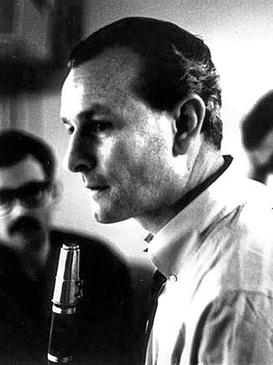Related Research Articles

Delores LaVern Baker was an American rhythm and blues singer who had several hit records on the pop charts in the 1950s and early 1960s. Her most successful records were "Tweedle Dee" (1955), "Jim Dandy" (1956), and "I Cried a Tear" (1958).

James Peter Giuffre was an American jazz clarinetist, saxophonist, composer, and arranger. He is known for developing forms of jazz which allowed for free interplay between the musicians, anticipating forms of free improvisation.
The Ravens were an American R&B vocal group, formed in 1946 by Jimmy Ricks and Warren Suttles. They were one of the most successful and most influential vocal quartets of the period, and had several hits on the R&B chart in the late 1940s and early 1950s.

The Jordanaires were an American vocal quartet that formed as a gospel group in 1948. Over the years, they recorded both sacred and secular music for recording companies such as Capitol Records, RCA Victor, Columbia Records, Decca Records, Vocalion Records, Stop Records, and many other smaller independent labels.
The Harptones are an American doo-wop group which formed in Manhattan, New York in 1953.

"Tweedlee Dee" is a rhythm and blues novelty song with a Latin-influenced riff written by Winfield Scott for LaVern Baker and recorded by her at Atlantic Records' studio in New York City in 1954. It was her first hit, reaching number 4 on Billboard magazine's R&B chart and number 14 on its pop chart. It was Scott's first commercially successful song.
Winfield Scott, also known as Robie Kirk, was an American songwriter and singer. He wrote or co-wrote the hit songs "Tweedle Dee" for LaVern Baker, and he was a co-writer with Otis Blackwell of "Return to Sender" for Elvis Presley. "Return to Sender", written for the Presley film Girls! Girls! Girls!, was a U.K. No.1 single and peaked at No.2 on the U.S. Billboard Hot 100.

Al Cohn was an American jazz saxophonist, arranger and composer. He came to prominence in the band of clarinetist Woody Herman and was known for his longtime musical partnership with fellow saxophonist Zoot Sims.

The Chords were an American doo-wop vocal group formed in 1951 in The Bronx, New York, known for their 1954 hit "Sh-Boom", which they wrote. It is the only song they created that reached mainstream popularity.
Plas John Johnson Jr. is an American soul-jazz and hard bop tenor saxophonist, probably most widely known as the tenor saxophone soloist on Henry Mancini’s "The Pink Panther Theme". He also performs on alto and baritone sax as well as various flutes and clarinets.
Otis Williams and the Charms were an American doo-wop vocal group in the 1950s, who were originally billed as The Charms. Williams is not related to Otis Williams of The Temptations.
The Larks were an American vocal group, active in the early 1950s. They were not the same group as the Los Angeles–based Larks featuring Don Julian, nor the Philadelphia-based group The Four Larks.
"Early Autumn" is a song composed by Ralph Burns and Woody Herman with lyrics by Johnny Mercer. The song grew out of the fourth segment of Burns's "Summer Sequence" concert piece. The original recording was made by Herman's second herd on December 27, 1947, which had a notable eight-bar solo by saxophonist Stan Getz. Herman asked Johnny Mercer to write lyrics in 1952 and he re-recorded the song taking the vocal duties himself.
David Pell was an American jazz saxophonist, bandleader and record producer. He was best known for leading a cool jazz octet in the 1950s.
"Jim Dandy" is a song written by Lincoln Chase, and was first recorded by American R&B singer LaVern Baker on December 21, 1955. It reached the top of the R&B chart and #17 on the pop charts in the United States. It was named one of The Rock and Roll Hall of Fame's 500 Songs that Shaped Rock and Roll and was ranked #352 on Rolling Stone's 500 Greatest Songs of All Time.
Grant Kitchings was a singer who was a member of the Ravens then, in the 1970s, a member of the Drifters.

Stan Kenton Conducts the Los Angeles Neophonic Orchestra is an album by bandleader Stan Kenton recorded in 1965 by Capitol Records.

The Du Droppers were an American doo-wop group formed in Harlem, New York, in 1952. Members of the band were experienced gospel singers in ensembles dated to the 1940s, and were one of the oldest groups to record during the era. Among the Du Droppers' most enduring songs are "I Wanna Know" and "I Found Out ", which both reached number three on the Billboard R&B charts in 1953.
Henry Oliver Jones was an American singer and songwriter.

LaVern Baker is the second studio album from American rhythm and blues singer LaVern Baker, released by Atlantic Records in 1957. This release was part of Atlantic Records' 8000 Series, a collection of self-titled budget albums by R&B artists, made to allow retailers to easily introduce audiences to popular singers. This was one of the first albums to collect popular singles from a single artist.
References
- 1 2 3 4 5 Bryan Thomas, "The Cues", Allmusic.com. Retrieved April 20, 2019
- 1 2 3 4 Marv Goldberg, "The Cues", UncaMarvy.com. Retrieved April 20, 2019
- ↑ Eugene Chadbourne, "Ollie Jones", Allmusic.com. Retrieved April 20, 2019
- ↑ Liner notes: The Cues, Why CD, Bear Family Records. Retrieved April 20, 2019
- ↑ "Winfield Scott Obituary". unionfuneralhome.com. Retrieved August 17, 2020.